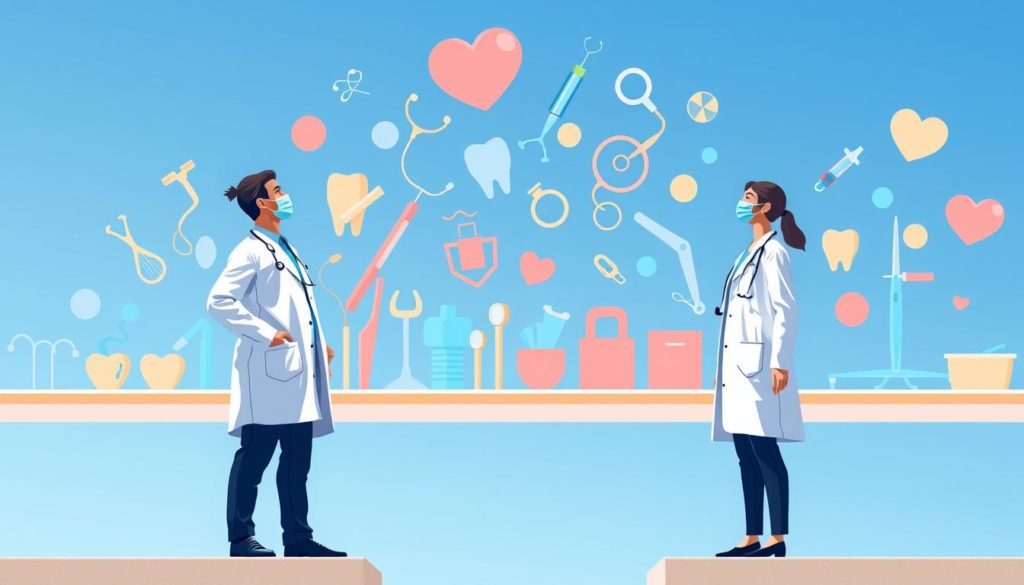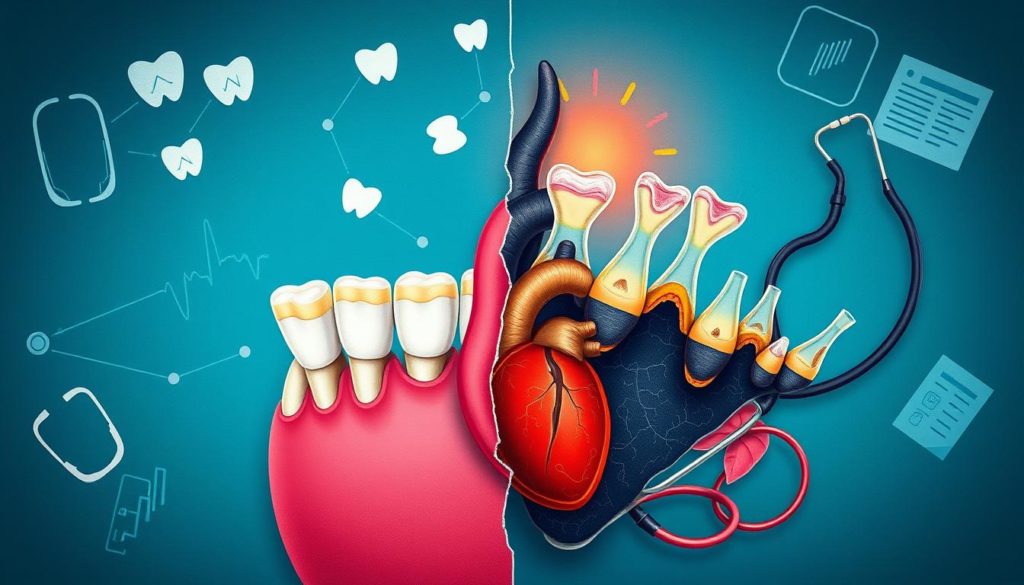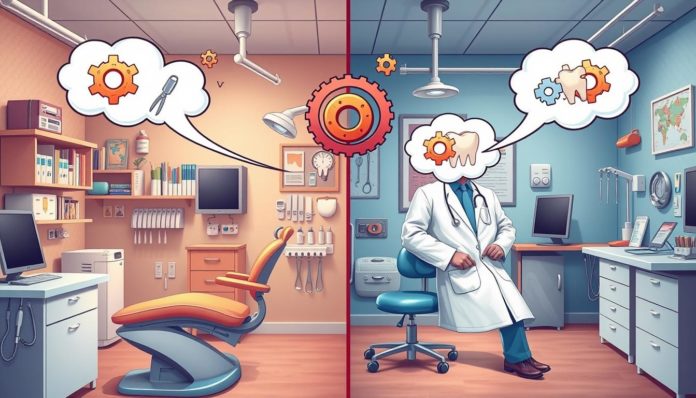Nearly 50% of adults over 30 face periodontal disease. This fact highlights the need for better dentist-doctor partnerships. Dental visits can seem scary, but they’re important for patient education and health. Dentists want doctors to help bridge the dental-health communication gap for better overall care.
Many people have wrong ideas about dental care. For example, they fear dental tools or dislike the feeling of teeth cleanings. Medical pros can help by calming fears about dental visits. They should also talk about the safety of dental X-rays and not swallowing fluoride toothpaste.
Willow Pass Dental Care, under Dr. Reza Khazaie, stresses the importance of dental check-ups. These check-ups keep your mouth healthy and your smile bright. This advice is part of a bigger goal to improve care and teamwork in health services.
Introduction to the Disconnect Between Dentistry and General Medicine
There’s a clear gap between dentistry and general medicine. Often, healthcare workers miss oral health during physical checks. This divide slows down teamwork in healthcare and causes overlooked chances for full patient care.
To better dental-doctor talks, it’s crucial to see how oral and overall health connect. For instance, dental problems might hint at larger health issues missed in normal doctor visits. By understanding this link, we can improve patient care and lower health worries.

| Primary Care Focus | Dental Care Focus |
|---|---|
| Cardiovascular health, Diabetes management | Oral hygiene, Cavity prevention |
| Diagnostic scans, Routine check-ups | Teeth cleaning, Dental X-rays |
| General wellness, Chronic illness management | Gum disease treatment, Oral cancer screening |
Boosting teamwork in healthcare helps everyone. When med professionals work together, patients get well-rounded care. This not only aids patients but also builds a stronger bond between doctors and dentists.
The Importance of Oral Health in Systemic Diseases
Oral health is key to spotting and managing different systemic diseases. Dentists play an important role in finding early signs of health problems through mouth exams. This shows how closely oral health and systemic diseases are linked.

Diabetes is a prime example, where oral signs of diabetes, such as gum disease, dry mouth, and oral infections, signal trouble ahead. Getting dental checks regularly helps catch these early. This can lead to quick action and better management of diabetes. If oral problems keep happening, it might need more checking and timely care.
Heart disease also connects tightly with oral health. Long-lasting inflammation from gum disease can lead to heart issues. So, it’s vital to tackle oral health problems early to help prevent heart disease.
Osteoporosis is another condition where dental checks are crucial. Loss of bone density might show up in the jaw first, indicating problems with bone health throughout the body.
Some oral cancers have early signs that dentists can spot before they become obvious. Catching these early greatly improves the chance of beating the cancer. This underlines why visiting the dentist regularly is crucial for oral health prevention.
Keeping oral health and systemic diseases in check together ensures we manage and prevent these linked health issues effectively.
Oral Health Signs that Indicate Broader Health Issues
Oral health can show signs of other health problems. Dentists are key in spotting these signs early. This early spotting helps manage overall health better.
Recognizing Early Signs of Diabetes
Spotting diabetes through oral health is key. Gum disease, dry mouth, and oral thrush can be signs dentists notice. These could point to diabetes that’s either not found or not well-managed.
The Link Between Gum Disease and Heart Disease
Gum disease and heart disease are closely linked. Issues like periodontitis can mean a higher chance of heart disease. This shows a two-way link between oral and heart health.
Oral Indicators of Osteoporosis
Dentists are crucial in finding signs of osteoporosis. A weak jawbone can be an early warning. The side effects of osteoporosis drugs on teeth also show the need for regular dental check-ups.
Detecting Early Symptoms of Oral Cancer
Finding oral cancer early greatly helps treatment. Dentists look for lasting sores, colored patches, and shaky teeth. Early detection means faster help and better outcomes.
| Health Condition | Oral Signs | Significance |
|---|---|---|
| Diabetes | Gum disease, dry mouth, oral thrush | Indicates potential undiagnosed or poorly managed diabetes |
| Heart Disease | Gum inflammation | Sign of chronic cardiovascular conditions |
| Osteoporosis | Jawbone weakening | Early indicator of bone density issues |
| Oral Cancer | Lesions, patches, loose teeth | Warrants further investigation for early cancer detection |
The Impact of Dry Mouth on Dental and Overall Health
Dry mouth, or xerostomia, often stems from medications, diseases, or lifestyle habits. It greatly affects dental health by weakening saliva’s protective role.
Saliva is crucial for oral health. It washes away food bits, balances acids from bacteria, and fights diseases in the mouth. Less saliva means more dental problems:
“Dry mouth causes a direct increase in plaque, tartar, and cavity formation,” noted a leading dental expert.
With less saliva, we need targeted treatments for dry mouth. Dentists are key in guiding patients on handling dry mouth. They might suggest special mouthwashes, regular dental visits, and drinking more water.
| Condition | Impact on Oral Health |
|---|---|
| Reduced Saliva Production | Increased plaque, tartar, and cavities |
| Oral Microbiome Health | Imbalance leading to bad breath and infections |
| Medications | Side effects contributing to dry mouth causes |
Addressing dry mouth is key for both oral and overall health. If you have dry mouth, see your dentist. They can help manage it with the right steps.
Role of Diet in Maintaining Dental Health
Good oral health means more than just brushing and flossing. It requires understanding how your diet impacts dental health. Eating well boosts your dental hygiene routines. It makes your teeth and gums stronger. But, eating lots of sugars and acids can damage your teeth.
Sugary sodas and teeth don’t mix well. These drinks are not just bad for your waistline; they harm your teeth. They make your mouth acidic, causing enamel to wear away and cavities to form. Drinking these often can raise your risk of diabetes and gum disease.
Diet, dental hygiene, and general health are closely linked. Eating lots of fruits and veggies helps make more saliva. This cleans your teeth and reduces acid. Regular dental checkups are key, as highlighted in this informative resource. They catch problems early.
| Food/Drink | Impact on Teeth | Recommendation |
|---|---|---|
| Sugary Sodas | High sugar content leading to cavities. | Limit intake and rinse with water afterward. |
| Fruits and Vegetables | Stimulates saliva production and cleans teeth naturally. | Include more in your daily diet. |
| Dairy Products | Rich in calcium and phosphates, strengthening enamel. | Consume regularly for improved dental health. |
The diet impact on dental health is huge. Adding healthy foods to your dental hygiene routines makes a huge difference. What you eat today shapes your smile tomorrow.
Risks Associated with Coffee, Tobacco, and Alcohol
Drinking coffee, using tobacco, and having alcohol can all affect your teeth and mouth. Knowing how they each change your oral health helps you choose wisely. This can help keep your smile healthier.
Effects of Coffee on Teeth
Coffee can damage teeth because it’s acidic and has tannins. These can wear down dental enamel, causing sensitivity and cavities. Coffee drinkers might also see their teeth get stained, making a white smile hard to keep.
Tobacco and Oral Cancer Risks
Using tobacco greatly raises the chance of getting oral cancer. Besides cancer, tobacco can dry out your mouth, stain your teeth, and wear down enamel faster. Quitting smoking is a smart move for lowering these risks.
Alcohol’s Impact on Oral Health
Drinking too much alcohol is bad for your teeth. It can lead to oral cancer, gum disease, and more cavities. Alcohol dries out your mouth, which means less saliva to clean teeth and fight acid. That can cause more bacteria growth.
- Coffee’s effects on teeth: Enamel erosion and staining
- Tobacco use and oral cancer: Increased risk of cancer, dry mouth, staining
- Alcohol consumption dental implications: Higher risk of oral cancer, gum disease, and tooth decay
Things Dentists Wish Doctors Knew about Dental Hygiene
Dental professionals have key insights on oral and general health. They want to share this knowledge with doctors. This can make patient care better by including oral health tips in routine advice.
The Importance of Regular Flossing
Flossing regularly is key to removing plaque and stopping gingivitis. But, many people skip it. Doctors should tell their patients about the benefits of flossing. A good flossing routine is vital for stopping oral diseases and keeping overall health strong.
Proper Brushing Techniques
Brushing the right way is very important for dental health. Doctors need to promote these brushing techniques to patients. They should use a soft-bristled brush to keep gums and enamel safe. Good brushing habits help keep teeth clean and prevent other health problems related to bad oral hygiene.
Understanding the Safety of Dental X-rays
Many people worry about the safety of dental X-rays. Yet, knowing the facts can reduce these worries. Dental X-rays are safe when done by skilled workers with the right protection. The radiation from dental X-rays is actually quite low. It’s about the same as the everyday radiation we all face.
Thanks to new technology, dental X-rays today are much safer. The latest digital X-ray machines use much less radiation. Also, there are strict safety rules to protect patients. These steps make sure dental X-rays are very safe.
Dental X-rays are key for finding mouth problems that we can’t see just by looking. They help dentists spot issues early. This means patients can get the right treatment sooner. So, the small risk from X-rays is worth it for the big benefits.
FAQ
Why do dentists prioritize patient education and hygiene?
Dentists focus on patient education and hygiene to ease fears about dental care. They want patients to know about their oral health and treatments. This helps people feel more comfortable and informed.
Is it safe to use dental probes during exams?
Yes, dental probes are vital for exams. They help find cavities and check gum health. Dentists make sure these tools are sterilized for each patient.
Should I swallow fluoride toothpaste?
No, you shouldn’t swallow fluoride toothpaste. Instead, spit it out after brushing. This prevents too much fluoride intake, which can lead to dental fluorosis.
Why might my teeth feel sensitive during cleanings?
Sensitivity during cleanings might happen because of exposed dentin or gum recession. Dentists work carefully to make sure you’re comfortable during cleanings.
Are dental X-rays safe?
Dental X-rays are considered safe. Trained professionals take them with special shielding. The radiation is very low, similar to what you encounter in nature.
How often should I have regular dental exams?
You should get dental exams every six months. These exams are key for good oral health. They help find problems early, preventing bigger issues.
What are the oral health signs that indicate broader health issues?
Dentists spot signs of major health problems, like diabetes or heart disease, during exams. Specific symptoms in your mouth can hint at these conditions.
What oral health symptoms might suggest diabetes?
Symptoms like gum disease, dry mouth, and oral thrush may suggest diabetes. These signs need checking by a doctor.
How is gum disease linked to heart disease?
Gum disease links to heart disease. This shows how oral health is important for your heart too.
What are the oral indicators of osteoporosis?
Osteoporosis can show up as weaker jawbones in your mouth. Dentists watch for these signs for better health management.
How can dentists detect early symptoms of oral cancer?
Dentists look for early signs like lesions or loose teeth. If you see changes in your mouth, get it checked.
What causes dry mouth, and how does it affect dental health?
Dry mouth happens from diseases, medicines, or lifestyle. Lack of saliva leads to more cavities. It’s important to get dental advice if you have it.
How does diet affect dental health?
Your diet heavily impacts your teeth. Acidic drinks and sugars can harm enamel, raising the risk for gum disease.
What are the effects of coffee on teeth?
Coffee can stain and wear down your enamel. But, regular cleanings and good dental care can keep your smile bright.
What are the risks of tobacco use for oral health?
Tobacco raises the risk of oral cancer and tooth problems. Quitting tobacco benefits your mouth and overall health.
How does alcohol consumption impact oral health?
Too much alcohol harms your dental health, like raising oral cancer risk. Drink moderately and keep up with dental care.
Why is regular flossing important?
Flossing removes plaque and bits of food between teeth. This helps prevent gum disease and keeps your gums healthy.
What are the proper brushing techniques?
To protect your enamel and gums, use a soft brush. Brush gently in circles twice a day for your best oral health.
Are dental X-rays really safe?
Yes, dental X-rays are safe with the right precautions. They use low radiation, so they’re like being outside for a day. They’re very important for finding dental issues.


